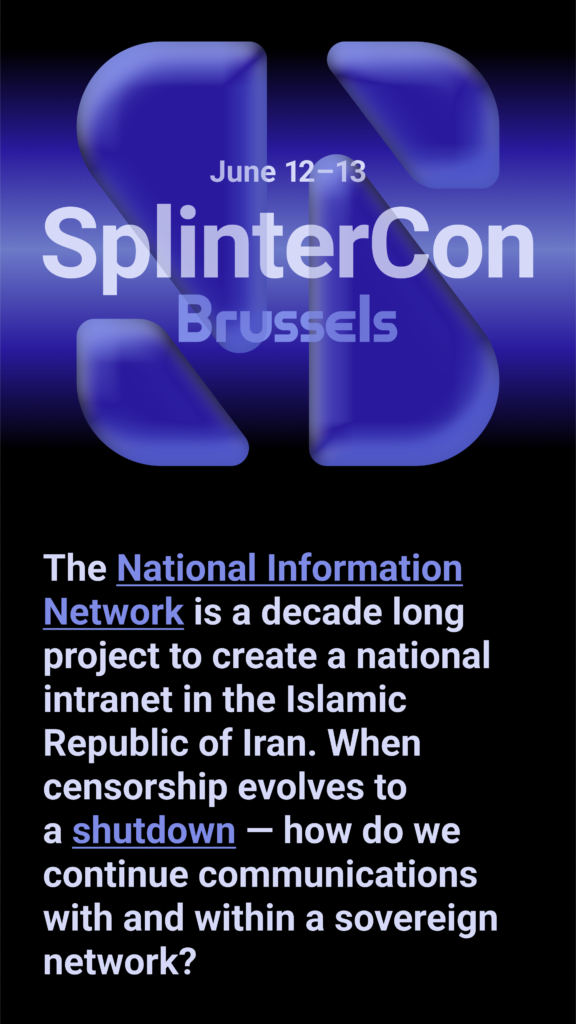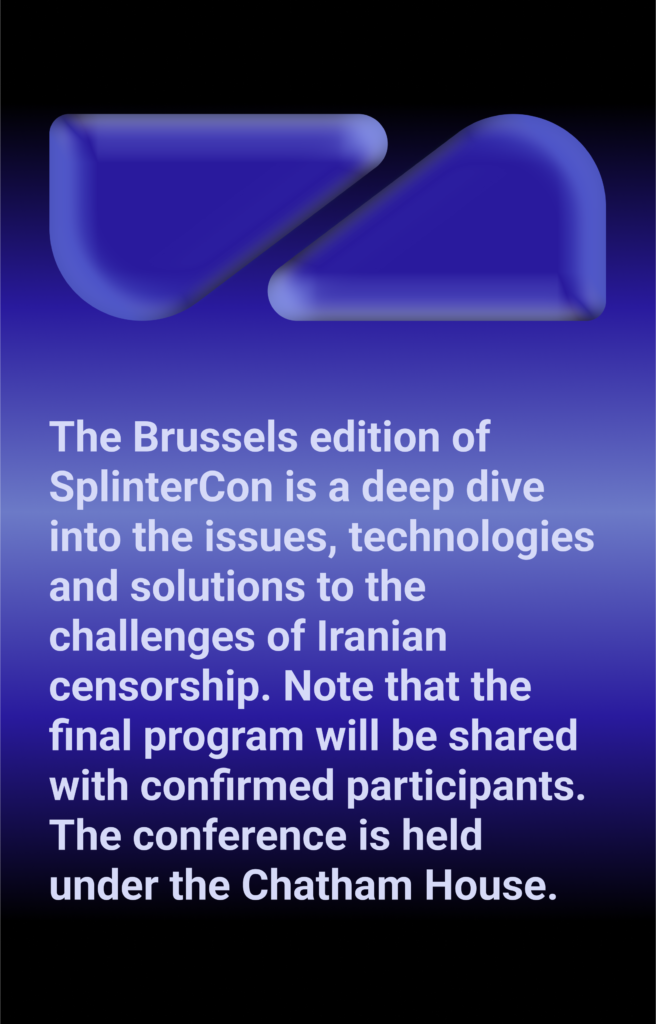



This report guides you through real-life scenarios of government-driven splinternets, from Iran to Cuba and Russia. It then dives deeper into the tools and methodologies for censored networks and the splinternet. It is built from abstracts of the conference talks and presentations.
In this report:
- A brief summary of the history of NIN
- Mobile Internet and surveillance in Iran
- Splinternet in action: methods of Iranian censorship
- Stone soup: Russian national technologies of splinternetization
- Cuba’s digital evolution: from an Intranet to the Internet and back
- Tools for the Splintered Networks
- Living in a splinternet ? – a demo


- June 12
- June 13
| Time | Session |
|---|---|
| 08:30 | Registration & welcome coffee |
| 09:30 | Opening remarks |
| 09:45 | Keynote: Censorship resilient ecosystems |
| 10:30 | Keynote: Shutdowns in MENA and Iran This presentation is focused on analysis of Internet shutdowns in Iran. It gives an overview of technologies and legal tools used to shut down the Internet in Iran and shares most recent data about the duration and consequences of these events for the Iranian civil society. |
| 11:00 | Break |
| 11:30 | Panel & Showcase: Wireless Iran – Punching National Internet with Existing & Emerging Technologies eQSat slides |
| 12:30 | Lunch |
| 13:30 | Keynote: Weaponizing Iranian mobile networks by security apparatus In Iran, where over 70% of internet traffic is routed through mobile devices, the landscape of surveillance and control is evolving rapidly. Drawing from a rich dataset of over 40 million users, this session delves into the multifaceted role of mobile technology in governmental oversight. From targeted surveillance initiatives dating back to the early 2010s to the more recent utilization of mobile platforms for psychological operations and crowd control since 2019, the session explores the intricate layers of control embedded within the country’s mobile networks. Key topics include the historical evolution and execution of the IMEI registry, the government’s initiatives such as the “Made in Iran” phone project and the importation ban on mobile phones to regulate operating systems. |
| 14:15 | Keynote: Censorship resilience for Iran, à la carte The session explores the current state of Iran’s protocol filtering and blocking mechanisms, both at the national firewall level and among internet service providers. It then provides a comprehensive list of recent standardized protocols and alternative methods designed to enhance censorship resilience or evasion. Presented in an ‘à la carte’ format, these options aim to assist web application operators in overcoming blocking measures in Iran. Each protocol or method is analyzed for its feasibility, considering factors such as ease of deployment, recent instances of Iranian infrastructure targeting, and susceptibility to future blocking. Covered protocols and methods include HTTP/3 (QUIC), Encrypted Client Hello (ECH), DNS over HTTPS, domain fronting, TCP packet segmentation, and TLS Record Fragmentation. list of strategies to circumvent blocking |
| 15:00 | Break |
| 15:30 | Parallel Sessions (Room I) Keynote: Challenging Internet Blackout and Censorship, What We’ve Learned from Iran, Afghanistan, and North Korea In this presentation, NetFreedom Pioneers highlights its innovative approach to overcoming information barriers across the globe. The organization draws on hard-earned lessons from contexts of intense surveillance and censorship, utilizing everyday technologies to create covert communication channels. By adapting satellite datacasting technology, NFP has effectively tailored solutions to diverse challenges—from facilitating the dissemination of uncensored information in Iran to enhancing educational access in rural Mexico. The presentation underscores the significance of understanding and leveraging existing platforms to develop discreet, effective solutions that cater to specific local needs, enhancing connectivity and freedom of information worldwide. (Room 2) Keynote: Hosting the fediverse in adversarial networks Learning from their experience in Ukraine, and with their sights set on expanding into more volatile and restrictive contexts, the dComms team will present their research into the potential dangers of hosting within the jurisdiction of countries who engage in aggressive internet censorship. The presentation will lay-out some of the risks of hosting in these contexts, will provide examples of how other projects address attempt to protect against these threats, and will allow extra time for discussion to discuss with audience members about possible solutions. |
| 16:00 | Parallel Sessions (Room I) Keynote: Anti-censorship in action. Case study of Meduza x Jigsaw Circumvention and censorship is a cat-and-mouse game with state authorities. Unblocking requires finding a working strategy, combining different tools and making automated decisions. Meduza has been blocked since 2022 and its flagship mobile application with built-in circumvention is in constant development. Latest versions of the app include innovations from Outline SDK by Jigsaw. (Room II) Keynote: Findings from a decade of off-the-grid & delay tolerant messaging with qaul.net The off-the-grid messenger qaul was developed with activists during the Arab Spring in 2011 as a proof of concept for an off-the-grid P2P communication App with the ability to build its own independent communication infrastructure. |
| 16:30 | Parallel Sessions (Room I) Keynote: The Russian Conflict and its Impact on the Global Web Web PKI is designed to protect users’ communications on the Internet from being intercepted by malicious actors. However, if a legitimate controller of a subset of the network infrastructure becomes malicious, under certain conditions they can abuse their power to circumvent the protection of Web PKI and, for example, surveil internet users within their reach. This type of attack is called (state-level) HTTPS Interception, and attempts to legalize this practice by governments have already been documented. The ongoing conflict in Russia has brought renewed attention to the government’s attempts to decouple their network from the global web. This situation revives a critical question: How should we address such actors that exploit their authority to surveil internet users? Moreover, who holds the responsibility to tackle this issue, and whom do we empower to implement solutions? This talk briefly recaps those happenings focusing on Russia and and poses old questions anew. (Room II) Keynote: How Awala apps may circumvent Internet censorship This session presents Awala computer network where apps can exchange data with and without the Internet. In the future, Awala apps may also circumvent online censorship without additional apps or VPNs, and the process to relay data offline may be scalable enough to reach vast regions. Consequently, apps may be able to send and receive data, potentially bypassing any government-sponsored censorship at the network level, as long as the device itself is not compromised. |
| 17:00 | Closing remarks |
| Time | Session |
|---|---|
| 08:30 | Registration & welcome coffee |
| 09:30 | Opening remarks |
| 09:45 | Keynote: How to shutdown the Internet – for dummies This talk is an overview of tools and approaches to Internet shutdowns and network fragmentation. Focusing on Iran as the use-case it will track the logic of censors and regulators and present milestones from a free to an isolated web. |
| 10:30 | Keynote: A look at the digital landscape of Cuba: from Intranet to Internet This presentation offers a comprehensive overview of the evolution of internet access and censorship in Cuba, showcasing the resourcefulness and creativity of the Cuban people in their quest for information and communication. It examines the Cuban intranet, its fragmentation and components, their unique characteristics, and why they remain in use and are promoted by the regime today. We will also discuss the introduction of the internet to the public, the challenges the general population faced in connecting, and the innovative methods they developed to overcome these obstacles. Additionally, the presentation will trace the evolution of censorship, leading up to the current state of affairs. |
| 11:00 | Break |
| 11:15 | Showcase: Secure Communication During Internet Shutdowns with Nahoft; Bring YourVPN; Blockathon intro Nahoft is an offline encryption (and obfuscation) tool built by Operator, from U4I’s initial design and in collaboration with them. With a few extra steps it is possible to use Nahoft to send encrypted and obfuscated messages using almost any other intranet-enabled messaging application. |
| 12:00 | Keynote: What awaits the Russian Internet in the next couple of years This talk is a negative thinker’s forecast. It describes key milestones of Russian censorship and sketches the scenario of what awaits the Russian Internet in the next couple of years. |
| 12:30 | Lunch |
| 13:30 | Parallel sessions: (Room I) Workshop: Measuring Circumvention Techniques This workshop focuses on a practical task: how to measure efficiency of a VPN. We will first hear a lightning talk from Solitech, a new circumvention project which also engages into user research and deploys test probes to run automated measurements within censored networks. Workshop participants will be invited to improve testing methodologies and find ways to include users and their real life behavior and perception of censorship. (Room II) Blockathon: Building a Splinternet This session will provide background and technical detail on the Blockathon setup. This will be followed by time for discussion on possible use-cases, and improvements to the stack. |
| 14:30 | Parallel sessions: (Room I) Bridging isolated networks: technologies and ideas This session explores advanced technologies and strategies for linking isolated networks to the global infrastructure. Topics include satellite communication and its security implications, extending mobile coverage across borders, using point-to-point microwave technology for high-speed links, and alternative non-TCP/IP terrestrial networks. (Room II) Characterizing and bypassing censorship remotely with the Outline SDK, remote proxies and AI In this session, learn to use the Outline SDK with remote proxies to collect and analyze data, building a decision tree model to explain observations. We will examine recent censorship in Russia and Iran, revealing shifts in the landscape and demonstrating how to bypass existing censorship. |
| 15:30 | Break |
| 16:00 | Parallel sessions: (Room I) The Russian National Domain Name System: Structure, Evolution, and Global Impact on Internet Freedom This presentation discusses the development and implications of the Russian National Domain Name System (NSDI). It details the historical context and legislative changes leading to increased internet censorship in Russia, the structure and functionality of the NSDI, and its effects on internet freedom both within Russia and globally. It highlights the main stages that have led to extensive government control and monitoring of internet traffic in Russia. (Room II) The Incident Response Working Group The Incident Response Working Group is a coalition of stakeholders from organizations that help people get back online during Internet shutdowns. The goal of the working group is to foster coordination among these organizations by breaking down barriers to collaboration. This meetup of the working group will feature a report back on Operator Foundation’s needs assessment survey of the incident response readiness of the Internet freedom community, as well as a discussion on the development of a shared glossary of terms and metrics for detecting and measuring Internet shutdown incidents. |
| 17:00 | Parallel sessions: (Room I) Blockathon: Capture the Flag (Room II) Blockathon: Ethics and Privacy |
| 18:00 | Closing remarks |





